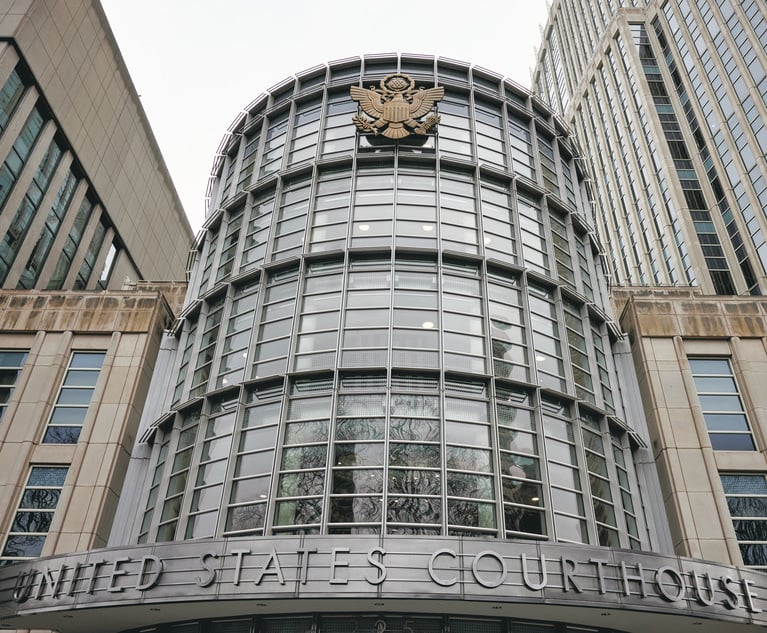Handicapping the 'Varsity Blues' Sentencing
In this Corporate Crime column, Steven M. Witzel and Renee E. Turner provide an overview of the college admissions scandal; the sentencing issues faced by the various groups of defendants; the bellwether Vandemoer sentencing and its implications; and the arguments for severe sentences as well as for leniency.
September 04, 2019 at 02:00 PM
11 minute read
 Steven M. Witzel and Renee E. Turner
Steven M. Witzel and Renee E. Turner
Perhaps the case most discussed this year around the nation's proverbial water cooler has been the infamous college admissions scandal "Operation Varsity Blues." In March 2019, 51 defendants were charged in Massachusetts federal court with a variety of criminal offenses, and assigned to seven judges. As this column goes to press, 28 have pleaded not guilty and 23 have pleaded guilty. No trial dates have been scheduled, but sentencing dates for all but one of the convicted defendants have been scheduled over the next few months.
The first (and only) defendant to be sentenced was John Vandemoer, a former Stanford University sailing coach. Vandemoer signed a plea agreement with sentencing guidelines of 33 to 41 months' imprisonment wherein the government agreed to recommend an 18-month sentence; in its sentencing memorandum, the government asked for a 13-month sentence. Instead, Vandemoer avoided jail altogether, receiving six months of home confinement, and a "time served" sentence of one day. The outcome was understandably seen as a setback for the prosecution and a cause for optimism for the rest of the defendants.
This column provides an overview of the admissions scandal; the sentencing issues faced by the various groups of defendants; the bellwether Vandemoer sentencing and its implications; and the arguments for severe sentences as well as for leniency. With this perspective, the reader is invited to handicap the sentences unfolding in the coming months.
The 'Varsity Blues' Scandal
The nation's largest-ever college admissions bribery/fraud prosecution implicates parents, test administrators and college coaches in a widespread effort to rig the admissions process for children whose parents were willing to cheat and pay large sums of money. The core allegations include bribes to college exam administrators to facilitate cheating on college entrance exams, and bribes to college coaches and athletic administrators at universities to guarantee admission as elite athletic recruits to applicants who played little or no sports. The allegations paint an unflattering narrative of privileged parents circumventing a supposedly merit-based system of college admissions. William "Rick" Singer—the "mastermind" of the scandal—cooperated with the government. He taped conversations with coaches and parents who used his college placement company to commit the charged crimes.
Although one can empathize with a parent's desire for their child to obtain the best college experience, the fact is that not everyone is qualified to attend elite colleges. Based on documents and transcript excerpts of taped conversations set forth in the charging instruments and sentencing memoranda, this is certainly true of many of the children involved in the scandal, most of whom were seemingly unaware of their parents' actions. There was an overwhelming onslaught of publicity when the case was filed and individuals were arrested.
This case continues to resonate through news cycles and on social media maybe because of what it may reflect about values, opportunity, merit and entitlement in America today. The nation's collective attention was heightened because of the elite colleges where the admissions process was compromised (including Georgetown, Stanford, Texas, the University of Southern California, Wake Forest and Yale), the celebrities charged with crimes (actresses Felicity Huffman and Lori Loughlin), and the inflammatory statements and conduct from myriad other prominent parents (and in some cases their children).
The Defendants and the Range of Conduct
In addition to the Hollywood celebrities, the parents charged include a number of CEOs, successful entrepreneurs, law firm partners and financial industry leaders. The bribes paid through Singer to facilitate test cheating and false athletic credentials ranged from $15,000 to $6.5 million, but were typically in the mid-six figure range. The 15 parents who have pleaded guilty have signed plea agreements with sentencing guidelines as low as 0-6 months, and as high as 37-46 months, with the government typically agreeing to recommend sentences at the low end of the applicable guidelines ranges.
The most important factor in the sentencing guidelines calculation for the parents as reflected in the plea agreements is the amount of their illegal payments. Among other factors that may distinguish the parents will likely be character and personal background, acceptance of responsibility, any prior bad conduct, and any mitigating or exacerbating conduct surrounding the circumstances of the offense.
The athletic coaches were in positions to falsely portray applicants who were not athletes as elite athletes deserving of admissions priority. The six coaches (from Texas, USC and Yale) who have pleaded guilty have signed plea agreements with sentencing guidelines as low as 15-21 months, and as high as 46-57 months, again with the government agreeing for all to recommend sentences at the low end of the applicable guidelines ranges. As with the parents, the key factor in the sentencing guidelines determinations for the coaches is the amount of the payments. Based on the Vandemoer sentencing, the issues of whether any money went into the coaches' own pockets, whether this was a one-time aberration or an established pattern with Singer, and whether the applicants were admitted to and attended the school, may distinguish among the coaches.
The test administrators and related academic professionals allowed and facilitated cheating, at times with professional test takers. This of course raised the scores of the underperforming applicants. At this point, just Singer, his bookkeeper and one test taker have pleaded guilty. Singer is facing a guidelines range of 188-235 months; as a cooperator, his sentence is likely to be much lower when he is sentenced on September 19.
The Vandemoer Sentencing
In June, former Stanford sailing coach John Vandemoer was sentenced to one day time served—for the hours when he was arrested and processed—six months of home detention, and two years of supervised release. He had pleaded guilty to accepting money for the sailing program from Singer in exchange for falsely designating Singer's clients as athletic sailing recruits. Vandemoer's plea agreement tied the guidelines to the amount of money paid through Singer as a proxy for financial losses to the universities. However, the sentencing judge ruled that Stanford suffered no "calculable" financial loss because all the money received from Singer went into the sailing program; none of it went into Vandemoer's pocket.
At sentencing, the court noted that Vandemoer was among the "least culpable" of the defendants because he didn't keep any of Singer's money and put it all ($610,000) into the sailing program, and because none of the three Singer clients who applied for admission to Stanford actually went there. The court further referenced the 27 "extraordinary" letters of support from Stanford sailors and others. Vandemoer also owned up to his crime when approached by authorities. Vandemoer stated that he believed that all three students had some sailing experience (but did not check into their credentials provided by Singer), that they would be "role players" on the sailing team and that he was helping Stanford by securing "donations" which would be used for the program.
The court suggested that Vandemoer was somewhat of a victim of Singer, although it admonished Vandemoer that he also "knew what he was doing was probably wrong." Transcript excerpts of taped conversations between Singer and Vandemoer that were included in the government's sentencing memorandum showed that Vandemoer knew that at least one applicant on behalf of whom Singer paid Vandemoer was not a real athlete. There is little question, therefore, that Vandemoer knew what was up.
The Vandemoer sentencing raises the larger point about who was victimized by the conduct. The Government argued at the Vandemoer sentencing that schools were deprived of the "honest services" of their salaried employee-coaches. Although not at issue in the Vandemoer case, the Government also maintained that schools were also financially injured to the extent that coaches kept money for themselves, and by having to expend funds to educate wrongly-admitted students, especially if they were subsequently dismissed. Other potential victims discussed in the wake of the scandal include the college admissions test companies, and those students who would have been admitted to elite schools but lost their spots to fraudulently bolstered applicants.
Potential Sentencing Arguments in the Upcoming Cases
The seven District of Massachusetts judges assigned to the 51 defendants will understandably have different perspectives on the case and sentencing. There is also a wide spectrum of alleged criminal behavior among the defendants, who will each have their own individual stories and circumstances. Some of them may of course go to trial and some may be acquitted, but nearly half have already pleaded guilty.
The determination by the Vandemoer sentencing court that there was a zero "loss" amount was a good development for the coaching defendants. According to the Vandemoer sentencing arguments, however, he may be the only coach who did not personally profit. But if the other coaches have core circumstances similar to Vandemoer's—no (or little) personal profit and all (or most) money received went into the sports program—they can point to Vandemoer to seek lenient sentences, especially if the actual money at issue was less than the $610,000 Vandemoer received for Stanford.
This analysis is relevant only to the coaches, who controlled the funds that Singer paid them. In contrast, the sentences of parents who paid money to Singer knowing that it was being wrongly used to bolster their children's applications should not be affected by what the coaches eventually did with the money. Simply put, the prosecutors will argue that the parents should have known that they were paying Singer a lot of money and should have expected that some of it was lining the pockets of complicit administrators or coaches.
Regarding the parents, there may be a difference between those who paid to have their children wrongly bolstered as athletes and those who cheated on the entrance exams by paying a test taker. Some judges may view resume padding in the context of athletic prowess—especially when the child at least actually participated in the sport—as somewhat less egregious than paying someone to take a test for an applicant. That could follow if a judge had the perspective that there are gray areas in the college admissions process, but that cheating on admissions tests crosses a bright line.
There are myriad gray areas that wealthy and privileged parents can use to bolster their children's chances of admission. Parents can make hefty donations to a university that are legitimate on their face yet tend to give their children favored admission status. Other accepted and legal ways that allow the wealthy to increase their children's chances of admissions to elite universities include sending their children to expensive private high schools, paying for academic tutoring, paying for admissions test preparation classes or providing them the financial safety net to take non-paying internships that assist in their application profile. On point here, wealthier parents can also provide their children with specialized coaching in chosen sports, which the children can leverage with better performances to improve their athletic profile. Universities have created an accepted system of giving athletes preferential treatment in admissions.
Many parents will undoubtedly seek leniency by describing their actions as misguided attempts to help their children, blindly motivated by their love and devotion. However, there are also general deterrence considerations here that many judges would find militate in favor of severity. This case has received a great deal of publicity, and the media will certainly report on the sentencings of celebrities and the slew of elite parents. This scandal has undermined trust and integrity in the entire college admissions process. The conduct has also reinforced stereotypes that people of wealth and privilege in the United States do not have to play by the rules. Finally, the normal sentencing considerations of prompt acceptance of personal responsibility, character evidence and admission of remorse, will likely be even more important under the glare of the public's eye.
Conclusion
As the defendants are sentenced (after pleading guilty or after conviction at trial), the water cooler discussions will continue unabated. In evaluating and discussing the sentences, the considerations discussed above should help the reader navigate the sentencing landscape. Given that there are seven different judges who will sentence the different defendants, it would be surprising if the Vandemoer result was the norm. There will likely be few slaps on the wrist, save for the least culpable among the various groups. Rather, the odds favor considerable prison time for some, and at least some prison time for most. That's the handicapping here.
Steven M. Witzel is a partner of Fried, Frank, Harris, Shriver & Jacobson and chair of the white-collar defense, regulatory enforcement and investigations practice. Renee E. Turner is an associate at the firm.
This content has been archived. It is available through our partners, LexisNexis® and Bloomberg Law.
To view this content, please continue to their sites.
Not a Lexis Subscriber?
Subscribe Now
Not a Bloomberg Law Subscriber?
Subscribe Now
NOT FOR REPRINT
© 2025 ALM Global, LLC, All Rights Reserved. Request academic re-use from www.copyright.com. All other uses, submit a request to [email protected]. For more information visit Asset & Logo Licensing.
You Might Like
View All
The Met Hires GC of Elite University as Next Legal Chief

NY Appellate Panel Cites Student's Disciplinary History While Sending Negligence Claim Against School District to Trial

'No Evidence'?: Big Law Firms Defend Academic Publishers in EDNY Antitrust Case
3 minute read
'Substantive Deficiencies': Judge Grants Big Law Motion Dismissing Ivy League Price-Fixing Claims
3 minute readTrending Stories
- 1In Novel Oil and Gas Feud, 5th Circuit Gives Choice of Arbitration Venue
- 2Jury Seated in Glynn County Trial of Ex-Prosecutor Accused of Shielding Ahmaud Arbery's Killers
- 3Ex-Archegos CFO Gets 8-Year Prison Sentence for Fraud Scheme
- 4Judges Split Over Whether Indigent Prisoners Bringing Suit Must Each Pay Filing Fee
- 5Law Firms Report Wide Growth, Successful Billing Rate Increases and Less Merger Interest
Who Got The Work
J. Brugh Lower of Gibbons has entered an appearance for industrial equipment supplier Devco Corporation in a pending trademark infringement lawsuit. The suit, accusing the defendant of selling knock-off Graco products, was filed Dec. 18 in New Jersey District Court by Rivkin Radler on behalf of Graco Inc. and Graco Minnesota. The case, assigned to U.S. District Judge Zahid N. Quraishi, is 3:24-cv-11294, Graco Inc. et al v. Devco Corporation.
Who Got The Work
Rebecca Maller-Stein and Kent A. Yalowitz of Arnold & Porter Kaye Scholer have entered their appearances for Hanaco Venture Capital and its executives, Lior Prosor and David Frankel, in a pending securities lawsuit. The action, filed on Dec. 24 in New York Southern District Court by Zell, Aron & Co. on behalf of Goldeneye Advisors, accuses the defendants of negligently and fraudulently managing the plaintiff's $1 million investment. The case, assigned to U.S. District Judge Vernon S. Broderick, is 1:24-cv-09918, Goldeneye Advisors, LLC v. Hanaco Venture Capital, Ltd. et al.
Who Got The Work
Attorneys from A&O Shearman has stepped in as defense counsel for Toronto-Dominion Bank and other defendants in a pending securities class action. The suit, filed Dec. 11 in New York Southern District Court by Bleichmar Fonti & Auld, accuses the defendants of concealing the bank's 'pervasive' deficiencies in regards to its compliance with the Bank Secrecy Act and the quality of its anti-money laundering controls. The case, assigned to U.S. District Judge Arun Subramanian, is 1:24-cv-09445, Gonzalez v. The Toronto-Dominion Bank et al.
Who Got The Work
Crown Castle International, a Pennsylvania company providing shared communications infrastructure, has turned to Luke D. Wolf of Gordon Rees Scully Mansukhani to fend off a pending breach-of-contract lawsuit. The court action, filed Nov. 25 in Michigan Eastern District Court by Hooper Hathaway PC on behalf of The Town Residences LLC, accuses Crown Castle of failing to transfer approximately $30,000 in utility payments from T-Mobile in breach of a roof-top lease and assignment agreement. The case, assigned to U.S. District Judge Susan K. Declercq, is 2:24-cv-13131, The Town Residences LLC v. T-Mobile US, Inc. et al.
Who Got The Work
Wilfred P. Coronato and Daniel M. Schwartz of McCarter & English have stepped in as defense counsel to Electrolux Home Products Inc. in a pending product liability lawsuit. The court action, filed Nov. 26 in New York Eastern District Court by Poulos Lopiccolo PC and Nagel Rice LLP on behalf of David Stern, alleges that the defendant's refrigerators’ drawers and shelving repeatedly break and fall apart within months after purchase. The case, assigned to U.S. District Judge Joan M. Azrack, is 2:24-cv-08204, Stern v. Electrolux Home Products, Inc.
Featured Firms
Law Offices of Gary Martin Hays & Associates, P.C.
(470) 294-1674
Law Offices of Mark E. Salomone
(857) 444-6468
Smith & Hassler
(713) 739-1250






